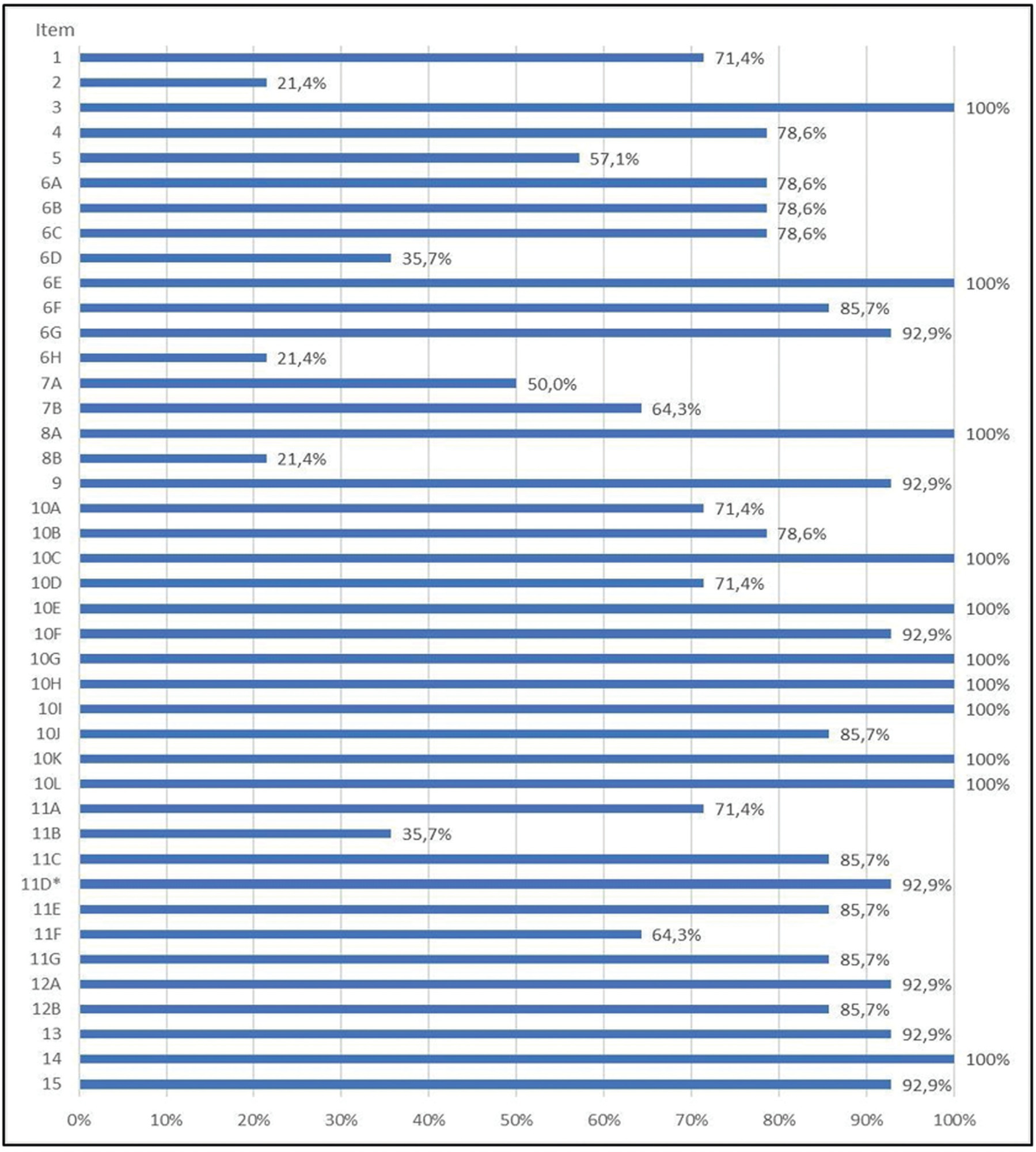-
Original Article00-00-2024
Validation of the Brazilian 10-item Cervantes Scale for the assessment of menopausal symptoms
Revista Brasileira de Ginecologia e Obstetrícia. 2024;46:e-rbgo7
Abstract
Original ArticleValidation of the Brazilian 10-item Cervantes Scale for the assessment of menopausal symptoms
Revista Brasileira de Ginecologia e Obstetrícia. 2024;46:e-rbgo7
Views528See moreAbstract
Objective:
To validate the 10-item Cervantes Scale (CS-10) among Brazilian women.
Methods:
This is a cross-sectional observational study involving women in the community aged 40–55 years in the Southern region of Brazil. They completed a general health, habits and socio-demographic questionnaire, the CS-10 and the Women’s Health Questionnaire (WHQ). Women unable to understand the survey, not consenting to participate, or having incapacity imposing difficulties during the completion of the questionnaire were excluded. A Confirmatory Factor Analysis (CFA) was conducted with the AMOS 16.0 software. Chi-square of degrees of freedom (χ2/df), the Comparative Fit Index (CFI), the Tucker-Lewis Index (TLI) and the Root-Mean-Square Error of Approximation (RMSEA) were used as indices of goodness of fit. Cronbach’s alpha coefficient was used for internal consistency.
Results:
A total of 422 women were included (premenopausal n=35, perimenopausal n=172, postmenopausal n=215). The CFA for the CS-10 showed a good fit (χ²/df=1.454, CFI=0.989; TLI=0.985; RMSEA=0.033; CI 90%=0.002-0.052; PCLOSE=0.921; Model p=0.049). Good reliability was established in CS-10 and WHQ (Cronbach’s alpha=0.724). Postmenopausal women had higher total CS-10 scores (p≤0.0001), reflecting worse quality of life (QoL) related to menopause symptoms and confirming the greater symptomatology evaluated by high total scores for WHQ found in this population when compared to those in the premenopausal period (p=0.041).
Conclusion:
The CS-10 is a consistent tool for health-related QoL in Brazilian mid-aged women.
-
Original Article12-11-2023
Adaptation and Validation of the International Pelvic Pain Society’s Quality of Life Questionnaire in Portuguese
Revista Brasileira de Ginecologia e Obstetrícia. 2023;45(10):575-583
Abstract
Original ArticleAdaptation and Validation of the International Pelvic Pain Society’s Quality of Life Questionnaire in Portuguese
Revista Brasileira de Ginecologia e Obstetrícia. 2023;45(10):575-583
Views216Abstract
Objective
In the present study, our aim was to translate, adapt, and validate the Pelvic Health History Form (a quality of life [QoL] questionnaire) of the International Pelvic Pain Society (IPPS) from English to Portuguese.
Methods
The study was approved by the Ethics and Research Committee (CEP, in the Portuguese acronym) and the IPPS. The "Transcultural Adaptation" method comprised 5 stages: translation, synthesis, backtranslation, expert review, and pretest. Cultural adaptation and validation included cognitive interviews and statistical analysis of unanswered items (> 15%) in 14 clinic patients from CPP and endometriosis clinic at Santa Casa de São Paulo.
Results
Strong equivalences were established between the USA and Brazil questionnaires in terms of semantics, idioms, experiences, and concepts. Eighteen culturally inappropriate items were identified and adjusted using the revised response rate index. The subjective form underwent rigorous assessments, confirming its accurate measurement of intended targets.
Conclusion
The methodology showed efficiency and equivalence, confirming its validity. The user-friendly format and inclusion of translated, adapted, and validated instruments in Portuguese make the form valuable for evaluating pelvic health, with potential for future research.
Key-words Chronic painPelvic painQuality of lifesurveys and questionnairestranslationvalidation studySee more
-
Original Article01-23-2022
Development and Validation of a Protocol for Pregnant Women Based on the Brazilian Dietary Guidelines
Revista Brasileira de Ginecologia e Obstetrícia. 2022;44(11):1021-1031
Abstract
Original ArticleDevelopment and Validation of a Protocol for Pregnant Women Based on the Brazilian Dietary Guidelines
Revista Brasileira de Ginecologia e Obstetrícia. 2022;44(11):1021-1031
Views172Abstract
Objective
To develop and validate a protocol for the use of the Dietary Guidelines for the Brazilian Population (DGBP) in the individual dietary advice for pregnant women assisted in primary healthcare (PHC).
Methods
Methodological study that involved the elaboration of a protocol in six steps: definition of the format, definition of the instrument to evaluate food consumption, systematization of evidence on food and nutrition needs of pregnant women, extraction of DGBP recommendations, development of messages of dietary guidelines and content, and face validity. The analyses of the validation steps were carried out by calculating the Content Validity Index (CVI) and thematic content analysis.
Results
As products of the steps, the protocol structure was defined and the dietary advice for pregnant women were elaborated, considering physiological changes, food consumption, nutritional and health needs, and socioeconomic conditions of this population. The protocol was well evaluated by experts and health professionals in terms of clarity, relevance (CVI > 0.8), and applicability. In addition, the participants made some suggestions to improve the clarity of the messages and to expand the applicability of the instrument with Brazilian pregnant women.
Conclusion
The instrument developed fills a gap in clinical protocols on dietary advice for pregnant women focused on promoting a healthy diet, contributing to a healthy pregnancy. In addition, it demonstrates potential to contribute to the qualification of PHC professionals and to the implementation of the DGBP recommendations.
Key-words dietary guidelinespractice guidelinesPrenatal nutritionPrimary health carevalidation studySee more


